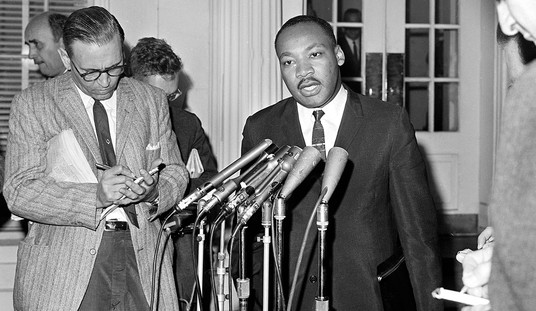I’m not sure which is more unsettling — the fact that a Supreme Court justice can get the First Amendment so wrong, or that it is so unclear that George Stephanopoulos thought to ask the question. Until now, I perhaps naïvely thought that everyone understood that the provocateurial pastor in Florida had the right to burn Korans, or any other book he legitimately owned, but that it was a really bad idea for many reasons, most of which Allahpundit argued in his excellent posts on the subject. Silly me:
Last week we saw a Florida Pastor – with 30 members in his church – threaten to burn Korans which lead to riots and killings in Afghanistan. We also saw Democrats and Republicans alike assume that Pastor Jones had a Constitutional right to burn those Korans. But Supreme Court Justice Stephen Breyer told me on “GMA” that he’s not prepared to conclude that — in the internet age — the First Amendment condones Koran burning.
“Holmes said it doesn’t mean you can shout ‘fire’ in a crowded theater,” Breyer told me. “Well, what is it? Why? Because people will be trampled to death. And what is the crowded theater today? What is the being trampled to death?” …
“It will be answered over time in a series of cases which force people to think carefully. That’s the virtue of cases,” Breyer told me. “And not just cases. Cases produce briefs, briefs produce thought. Arguments are made. The judges sit back and think. And most importantly, when they decide, they have to write an opinion, and that opinion has to be based on reason. It isn’t a fake.”
Hopefully, they put more thought into it than Justice Breyer does in this argument. The “fire in a crowded theater” standard is intended to limit government intrusion on free speech, not enable an expansion of it. It means that only when speech that will directly and immediately result in a threat to human life in the proximate setting can the government criminalize it — and it has to contain the element of malicious falsehood as well. After all, no one will prosecute a person who yells “Fire!” in a crowded theater when it’s really on fire, or when the person yelling honestly believes it to be so.
Otherwise, Breyer’s argument would put government in charge of judging the qualitative value of all speech. Would speech urging an invasion of Pakistan be therefore criminalized, too? After all, it might cause Pakistanis somewhere to riot and people to die, even if the argument is largely discredited in contemporary American politics.
Furthermore, the Supreme Court has already ruled on burnings as free speech. In both Texas v Johnson and US v Eichman, the court ruled that free speech trumped any offense and/or concerns about public safety raised by burning the American flag. In Johnson, the court spoke directly to this issue:
The State’s position … amounts to a claim that an audience that takes serious offense at particular expression is necessarily likely to disturb the peace and that the expression may be prohibited on this basis. Our precedents do not countenance such a presumption. On the contrary, they recognize that a principal “function of free speech under our system of government is to invite dispute. It may indeed best serve its high purpose when it induces a condition of unrest, creates dissatisfaction with conditions as they are, or … even stirs people to anger.”
Now, perhaps Breyer foresees a reversal of Johnson and Eichman, but that doesn’t appear to be where he’s leading. Instead, Breyer seems to want to put the Koran in a separate class for purposes of protest, a dangerous direction that flies in the other First Amendment restriction, the establishment clause regarding religion.
Put simply, Breyer couldn’t have possibly been more wrong in this answer, and one has to wonder just what kind of standard Breyer will apply to future cases of free speech.








Join the conversation as a VIP Member